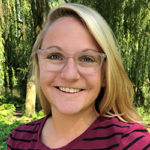Four graduate students at Florida universities have received John A. Knauss Marine Policy Fellowships, recognizing their outstanding achievement in marine and coastal policy research. The following winners have relocated to Washington, D.C. for one year to work in the legislative and executive branches of the federal government.
- Stacy Aguilera, University of Miami
- Samantha Dowdell, University of Miami
- Danielle Dodge, Florida Atlantic University
- Daniel Wolfe, Florida State University
The National Sea Grant College Program created the Knauss fellowship in 1979 to provide educational experiences to students that have an interest in ocean and coastal resources and in the national policy decisions affecting those resources.
Since Florida Sea Grant was established there have been 61 Knauss fellows from Florida universities.
“The Knauss Fellowship is a unique opportunity. It allows graduate students who are excellent marine scientists to spend a year in Washington learning how science is translated into policy,” said Karl Havens, Florida Sea Grant director.
“Florida has truly outstanding fellows this year and I know that they will make substantial contributions to marine policy as well as have great learning experiences.”

Stacy Aguilera
Stacy Aguilera recently graduated from the University of Miami where she earned a Ph.D. in ecosystem science and policy. Her dissertation research focused on social and ecological factors contributing to positive outcomes in coastal pelagic fisheries.
During her year in Washington, D.C. she will be working with the White House Office of Science and Technology Policy.
“My career goal is to use my science and policy background to contribute to creative, effective, and feasible policies to maximize marine resource use and ocean conservation benefits,” Aguilera said.
Aguilera’s previous experience in science policy includes participating in a two-week immersion at the American Meteorological Society Summer Policy Colloquium and by leading a small-scale fisheries working group at the Center for Oceans Solutions in Monterey, California.
“My research has evolved over the years, from investigating basic science questions to working on more interdisciplinary and collaborative projects,” Aguilera said. “Throughout my research, I realized that as fundamental as ecology is, we need to also understand the human dimensions of ocean issues.”
Aguilera received her master’s degree in earth systems with a focus in marine policy and her bachelor’s degree in biology from Stanford University.
“Ms. Aguilera is an energetic leader among her peers, has high ethical standards, and is a pleasure to collaborate with,” said Kenneth Broad, director of the University of Miami Abess Center for Ecosystem Science and Policy. “She has demonstrated leadership skills beyond her years. I would rank her in the top one percent of Ph.D. students I’ve advised.”

Samantha Dowdell
Samantha Dowdell is a recent graduate of the University of Miami where she earned her master’s degree in marine affairs and policy. Her thesis research focused on helping policymakers and stakeholders better understand industries in Miami-Dade County that depend on a healthy Biscayne Bay.
She will spend 2018 working at the NOAA Office of International Affairs in the Department of Commerce building, something that closely aligns with her future career goals.
“Throughout my career, I aspire to address issues such as domestic and international fisheries management, conservation of threatened marine species and coastal community vulnerability,” Dowdell said.
“As a Knauss Fellow, I will gain valuable insights into policy formation at the national level and may even have the opportunity to witness international proceedings. The skill development and connections this position provides will set my professional trajectory.”
Dowdell has gained experience with international issues through her time studying water resource law and policy in Vietnam and China. While there, she learned about the countries’ differing legal systems and methods of water resource management. She has also interned for the Conservation Law Foundation and the National Marine Sanctuary Foundation.
“I have spent my time building skillsets and gaining experiences that would allow me to shape national and international marine conservation policy,” she said.
Dowdell, who has also studied tropical ecology in Costa Rica and the Cayman Islands, earned her bachelor’s degree in biology and environmental studies from Dartmouth College.
“Samantha is dedicated to the conservation and preservation of the marine environment and continues to pursue opportunities that allow her to utilize her extensive skill set and learn new ones,” said Maria Estevanez, a senior lecturer in the University of Miami Department of Marine Ecosystems and Society.

Danielle Dodge
Danielle Dodge is a recent graduate of Florida Atlantic University’s Harbor Branch Oceanographic Institute where she earned a master’s degree in biology. For her thesis research, she used DNA fingerprinting to better understand coral reef health and dynamics for incorporation into better management strategies.
In her fellowship, she will be working for the National Science Foundation’s Division of Ocean Sciences as an ocean policy fellow.
“In this position, I will be at the forefront of translating advanced scientific research conducted through NSF and making it relevant for policymakers across multiple agencies and branches of federal government,” Dodge said. “Being able to link valuable scientific findings to create better management strategies at a national level is necessary to preserve important marine systems.”
Dodge earned her bachelor’s degree in environmental science from the University of Delaware. She said her passion for marine science grew after participating in a scientific diving program with at the Central Caribbean Marine Institute on Little Cayman Island.
The Women Divers Hall of Fame grantee has also interned with Reef Relief in Key West and served as a research assistant for HBOI’s Coral Molecular Ecology Research Lab, the University of Delaware Algal Physiology Research Group, and the Office of the Delaware State Climatologist.
“Through participating in several internships and outreach activities, I have been able to not only gain experience presenting to scientists in my field of study, but also translate my research and passion to the public.”
Joshua Voss, an assistant research professor at FAU and Dodge’s adviser said, “She takes her overall goal of combining research and outreach to enhance understanding and promote effective policies very seriously.”

Daniel Wolfe
Daniel Wolfe is a recent graduate of the Florida State University College of Law, where he earned a J.D. in environmental law and a master’s degree in oceanography. He will spend his fellowship working in the NOAA National Marine Fisheries Service Office of Aquaculture.
“I’m excited to work there because aquaculture is a growing industry that will be important for feeding the future,” Wolfe said. “Getting a Knauss fellowship is the culmination of my decision to dedicate my life to changing the world through influencing environmental law and policy.”
Wolfe has served as the editor-in-chief for the Journal of Land Use and Environmental Law, and a law clerk for both the Environmental Protection Agency’s Environmental Appeals Board and NOAA’s Office of General Counsel. While earning his law degree, his research focused on policy solutions to prevent invasive species that spread through the seas when they attach and foul ship hulls and other exposed surfaces.
“I argue that superior study designs have led to ballast water being taken seriously as an invasion vector by policymakers, while a lack of strong sampling studies has hindered the development of policy aimed at biofouling as an invasion vector,” Wolfe said.
Wolfe earned his bachelor’s degree in political science from the University of Florida. Once his year in Washington comes to an end, he hopes to work in the federal government to influence environmental law and policy.
“This fellowship is the first step to me achieving that goal,” Wolfe said.



